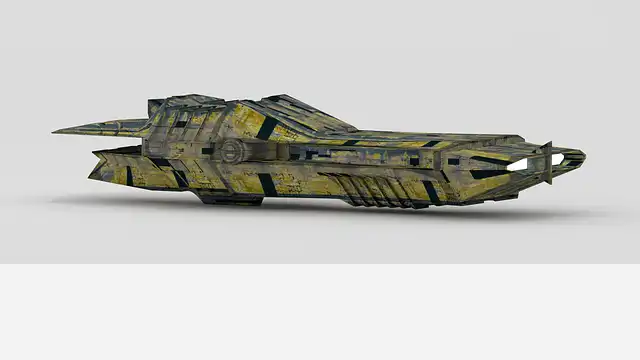The ‘Does It Fly?’ podcast separates fact from science fiction

That’s the premise — and tone — of the entertaining podcast Does It Fly?, hosted by astrophysicist and “mad scientist” (his words) Hakeem Oluseyi and actress, writer and “pop culture expert” Tamara Krinsky.
Not every follower favored program or movie is responsive to this podcast’s layout. An episode committed to demonic possession à la Beetlejuice feels unmoored and irregular, mostly due to the fact that there isn’t much science discussed– or truly to go over– on the topic.
Does It Fly? acknowledges its place in this history first. Oluseyi and Krinsky are, specifically, a self-proclaimed nerd and nerd, and they emphasize that they’re coming at these concepts from an area of love and happiness. Often a little way too much. Listening to the hosts’ small talk can feel like lurking in a fandom discussion forum chat, and it’s commonly alluring to fast-forward past that small talk to reach the great things.
After that Krinsky recommends that the TARDIS is flawed from a narration point ofview due to the fact that the program occasionally flouts its own rules about exactly how the TARDIS works, breaking a golden guideline of sci-fi. My sibling differed. Those logic leaps were totally justified, she claimed.
One of the most evident issue, probably, with making a transporter job today is exactly how to first damage down a things into its standard devices– and what are those, anyhow? Atoms and particles? Quarks and electrons? Even if you could, you ‘d need an enormous amount of storage for all that data– much beyond what current modern technology enables. And also if we resolve the storage trouble centuries from now, Oluseyi adds, there’s yet one more problem: just how to appropriately record and afterwards re-create all the vibrant information, like memories, that make up a person at any provided moment.
Audiences certainly will not constantly agree with the hosts’ analyses. However possibly that’s part of the point. Each episode communicates the sensation of jumping into the center of a recurring conversation, one that is totally anticipated to proceed after the hosts authorize off.
Launched roughly when a week given that April, each episode centers on a scientific research or modern technology idea from a preferred sci-fi program or film. Oluseyi’s astrophysics bona fides radiate when he describes, for instance, the difficulties of real-world Celebrity Expedition carrier technology, or ponders the expediency of making Star Wars’ lightsabers by utilizing magnetic fields to consist of plasma right into a deadly yet portable blade form. Take the carriers, “one of the most renowned conceits in all of science fiction,” Krinsky says. The most apparent concern, maybe, with making a carrier work today is how to initially damage down an object into its standard units– and what are those, anyhow? Scientific research Information was founded in 1921 as an independent, not-for-profit resource of accurate info on the most current news of medication, modern technology and science.
Science News was established in 1921 as an independent, nonprofit source of precise details on the latest information of science, innovation and medication. Today, our objective stays the very same: to equip individuals to review the news and the globe around them. It is published by the Society for Scientific research, a not-for-profit 501( c)( 3) subscription company committed to public interaction in scientific research and education (EIN 53-0196483).
And Does It Fly? has some really fascinating minutes. Oluseyi’s astrophysics authentic shine when he explains, for example, the quandaries of real-world Star Trip carrier innovation, or contemplates the expediency of making Celebrity Wars’ lightsabers by using electromagnetic fields to have plasma into a deadly yet portable blade form. (Do lightsabers fly? Oluseyi claims nah, none time quickly and possibly never.).
We go to a vital time and sustaining science journalism.
is more crucial than ever. Science News and our.
parent company, the Society for Science, require your assistance to strengthen.
scientific literacy and guarantee that vital social choices are made.
with science in mind.
We both took pleasure in the psychedelic concept that the program’s beloved, time-traveling blue phone booth resembles a black opening in lots of methods: It adjusts time; it’s bigger on the inside than the outside; and there’s also a theoretical kind of black hole, called a wormhole, assumed to act as a site via area. “Every little thing black holes do, the TARDIS does,” Oluseyi states, giving the not-a-phone-booth more or much less a scientific thumbs-up.
The hosts’ cheerful and frequently disorganized conversation functions well when they’re jumping ideas around concerning the physics of time traveling, or the tornado-analyzing silver-ball sensors of the 1996 flick Whirlwind, or the neurotechnology in Netflix’s 3 Body Trouble( SN: 7/19/24; SN: 4/23/24).
The podcast’s interesting spin on sci-fi scientific research– one that this author particularly valued– is the discussion of just how an imagined innovation does or doesn’t offer the total storytelling. From a storytelling standpoint, the carrier is main to numerous of Star Trek’s a lot of remarkable episodes, Krinsky states.
Take the transporters, “among the most iconic conceits in all of science fiction,” Krinsky states. The Celebrity Trek gadget can send out objects throughout great distances by transforming them right into energy and after that reconstituting them in the delivery area. Actually, the closest thing we need to such an innovation is quantum teleportation, in which quantum states of bits, but not the particles themselves, can be transferred from one location to another. This is not that, Oluseyi says.
Envision you’re hanging out at a bar with your extremely enthusiastic buddies, about two beers in, and someone brings up Star Trek. OK, but the carrier! Just how would that really work? What concerning the TARDIS of Physician That– does that thing also make sense? It made for so lots of great stories, however?
Launched roughly when a week considering that April, each episode centers on a scientific research or innovation concept from a preferred sci-fi show or film. The hosts spend most of 45 mins considering how well each principle functions– does it “fly”?
1 Butler prescient science2 Star Trek transporter
« Fresh insights into how we doze off may help tackle sleep conditionsAll your questions about Marburg virus answered »
